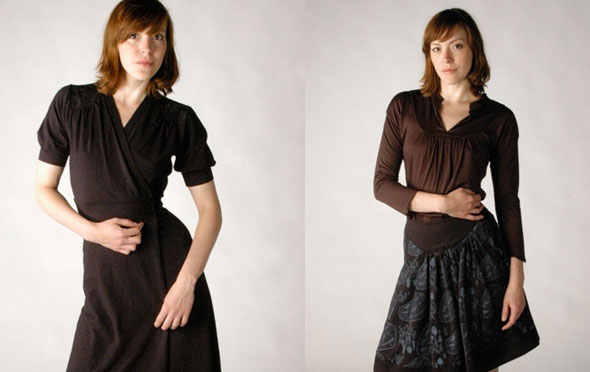
Eco Fashion: Passenger Pigeon
When you think of eco-friendly fashion in Toronto, one of the names on the top of the list is Passenger Pigeon. The company was started back in 2005 by OCAD grad Heather Schibli who later teamed up with Wendy Traas, a former student of fashion design at George Brown College. Today, they have a small studio at 135 Tecumseth Street (Unit #7, behind the Little Black Dress Shop) where they design, sample, print and warehouse their items. Theirs garments are all constructed locally in various parts of downtown Toronto.
Recently I connected with Heather to learn more about the company, the state of eco-fashion in Toronto and their plans for the coming year. Continue reading for the full interview.
What is the concept behind Passenger Pigeon?
We at Passenger Pigeon believe in supporting local business (we source our fabrics from Canadian suppliers and have everything made here in Toronto), the environment (we use environmentally responsible textiles), and playful designs (we do not follow the predicted colour trends and so forth. We work with colours and images that inspire us).
Where in Toronto can someone buy your clothing?
We sell our items at Heart on your Sleeve in Kensington Market, Propaganda on Yonge Street and Georgie Bolesworth on Dundas Street. We also sell online through our website.
What are some of your favourite items?
We are mostly excited about our up and coming Spring line, for Summer is the season for dresses and we love to design dresses. In our current line, Fall/Winter 2007/08, our favourite items are the Sparrow Skirt (for it can be dressed up or down, and can be worn into the summer) and the Lark Wrap Dress (due to its versatility and comfortable fit).

In what ways is your company/clothing environmentally friendly?
First and foremost, Passenger Pigeon is deemed an environmentally friendly company for its use of eco-conscious textiles. We source fabrics such as organic cotton, hemp, organic wool, lyocell, bamboo and soy. These fibres still leave a footprint on the planet, but a much much smaller one then their counterparts. We pay fair wages to our contractors, who sew our garments here in Toronto. All our patterned fabrics are printed with water-based inks, which are better for the environment than oil based inks. We use 100% recycled, non-bleached paper for our business cards, catalogues and signs (and in fact, most of our paper work is done on the computer. We print as little as possible) printed with vegetable ink. Neither Wendy or I own a vehicle- we bike or walk to our studio and cycle when doing errands. We donate to charities like Greenpeace and WSPA.
Is seems that most stores that sell eco-friendly fashion brands do so exclusively. Are traditional retailers not interested in offering eco-fashion options to their customers?
Unfortunately, fashion is an industry built on slave labour and under priced textiles. It has a long history of underpaying workers from farming the fiber to manufacturing the textile to constructing the garment. It is hard enough as a small designer paying Canadian wages to compete with larger companies who have their garments made very (too) cheaply off shore.
Once you factor in higher costs associated with proper pay for farmers and more vigilant farming due to no pesticides, eco-friendly garments, especially made by small design companies, are much much more expensive. Likewise, it is difficult for small boutiques to compete with giants like H&M or the Gap, thus pushing small store owners to source more economically viable local designs.
Passenger Pigeon is lucky to be supported by various small boutiques across Canada who focus on supporting Canadian design (not solely eco-friendly). We are only found in eco-friendly boutiques in the States, and surprisingly, these great little boutiques are rapidly growing in number. I think most boutique owners would like to offer green fashion (for it has come a long way in the past four years) but can not afford to since Canadians are accustomed to purchasing garments for less than their TRUE value.
Any plans for 2008 you'd like to tell us about?
As mentioned before, we are very exited about or Spring/Summer line. We are focusing on unbleached creams, warm blues and greys for this season with prints of bicycles and foliage. We also will be attaching a mildly political treat to each and every garment displayed on the racks at every store we sell through (it's a surprise so you'll have to look out for it)!
Anything else you'd like to add?
We plead - if you can not afford to support your local designers, than support second-hand shops. It lessens the burden on the planet. Avoid disposable clothing (items that survive only one or two seasons). It's best to buy good quality classic looks that you can continue to wear for years to come. Pick up sewing! It's surprisingly easy to convert an old sweater or dress into something fresh and exciting!
All photos from the Passenger Pigeon web site
Latest Videos
Latest Videos
Join the conversation Load comments







